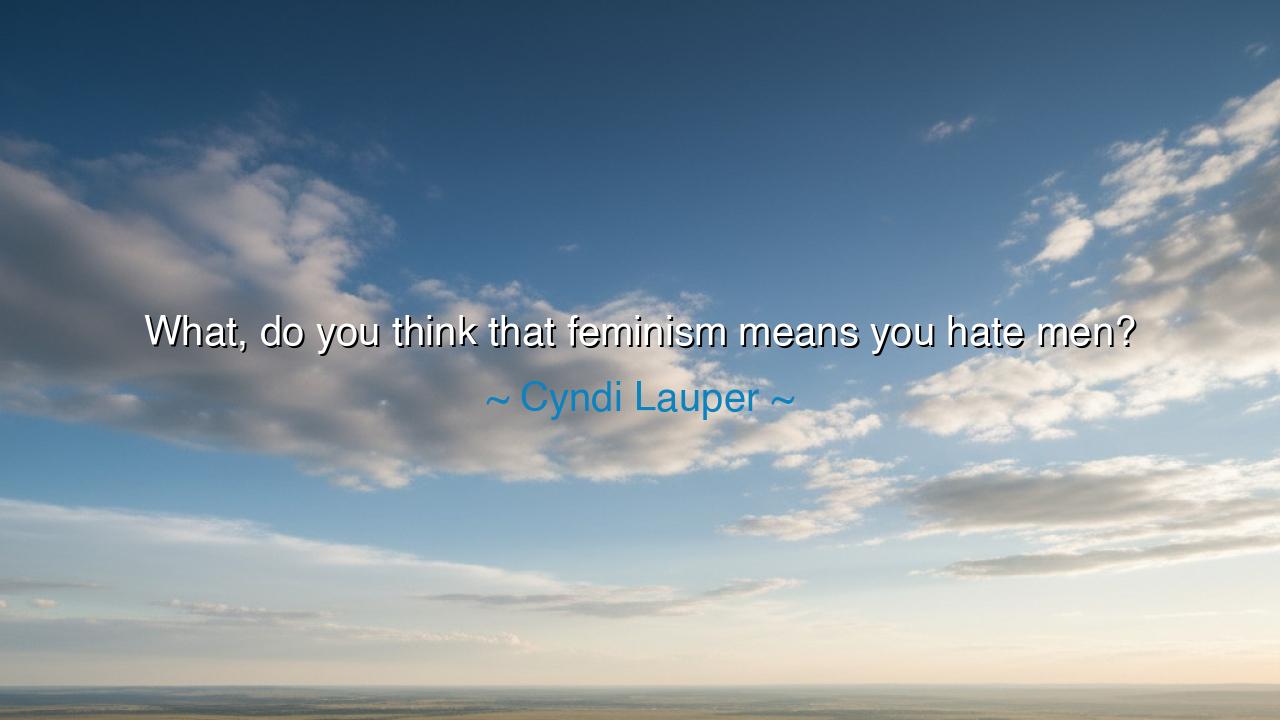
What, do you think that feminism means you hate men?






Hear me, O children of wisdom, for the words of Cyndi Lauper echo a truth that has reverberated through the ages, even as it finds its place in our present time. She said, "What, do you think that feminism means you hate men?" In these words, Lauper seeks to confront a misunderstanding that has plagued the very essence of feminism. It is a question that cuts to the heart of a misconception—that the pursuit of equality for women must somehow equate to hostility toward men. Feminism, she reminds us, is not a battle against men, but a struggle for the freedom, dignity, and rights of all individuals, irrespective of gender.
In the ancient world, the concept of equality was often a distant dream, for societies were structured on rigid hierarchies. The Greeks, for example, while celebrating the intellect and creativity of men, did not see women as equals. In Athens, women were largely confined to the home, their roles defined by their relationships to men—whether as daughters, wives, or mothers. Yet even in such a world, there were voices that challenged the status quo. The philosopher Plato, in his work The Republic, suggested that women, like men, could be guardians of the city, equally capable of virtue, wisdom, and strength. This vision of equality, though revolutionary, was still confined to the theoretical and did not translate into the everyday reality for women in ancient Greece.
It was not until much later in history, during the Enlightenment, that the voices of feminists began to rise more powerfully. Women like Mary Wollstonecraft, who wrote A Vindication of the Rights of Woman, argued that women were not inherently inferior to men, but that society had placed artificial barriers in their way. Wollstonecraft did not advocate for hatred of men, but rather for the freedom of women to pursue education, self-determination, and equality in all spheres of life. The idea of feminism was, from its very beginning, a call for empowerment, not division—a call to break down the walls that kept half of humanity from realizing their full potential.
Lauper’s question, in essence, is a challenge to the misrepresentation of feminism, one that has lingered in the cultural imagination. There has long been a tendency to associate feminism with anger, hostility, and division, but nothing could be further from the truth. Feminism, at its core, is a fight for justice and equality—a demand for a world where people are not judged, limited, or oppressed based on their gender. To hate men is not the foundation of feminism; to love humanity and recognize the shared value of all people is. Feminism is a movement that seeks to lift all individuals, men and women alike, from the chains of inequality and the burdens of unjust expectations.
Let us turn to the example of Susan B. Anthony, a key figure in the American women’s suffrage movement. She did not fight against men but against an unjust system that denied women the right to vote. Her vision was one of equality, where women and men could stand side by side as equals in democracy and society. She recognized that equality for women did not diminish the dignity or rights of men. Rather, it elevated the entire human spirit, allowing both men and women to contribute fully to the prosperity of their communities. Anthony’s work was not about antagonism but about unity, the unity of all people striving for justice.
The lesson we can draw from Lauper’s words and from the examples of great figures like Wollstonecraft and Anthony is one of understanding and compassion. Feminism is not a movement that seeks to destroy men, but to uplift all people, regardless of gender. It is a call to recognize the inherent value of each individual, to ensure that all have the freedom to live lives of dignity, respect, and opportunity. Feminism is, at its heart, about breaking down the barriers that divide us—whether those barriers are based on gender, race, or any other form of inequality. It is a call for a world where all people can be seen as equal and worthy of the same rights and freedoms.
So, O children, take this wisdom into your hearts: do not let the misunderstandings of others cloud your perception of justice and equality. Feminism is not about hostility or division—it is about empowerment and freedom for all people. Stand not in opposition to others, but in solidarity with the collective good. Know that when we strive for a world of equality, we do not diminish anyone’s worth, but rather, we elevate the dignity of all. Let your actions reflect this wisdom, for the true path to a just and harmonious world is found not in division but in unity, where each person—man or woman—can walk proudly in the light of their full potential.






AAdministratorAdministrator
Welcome, honored guests. Please leave a comment, we will respond soon